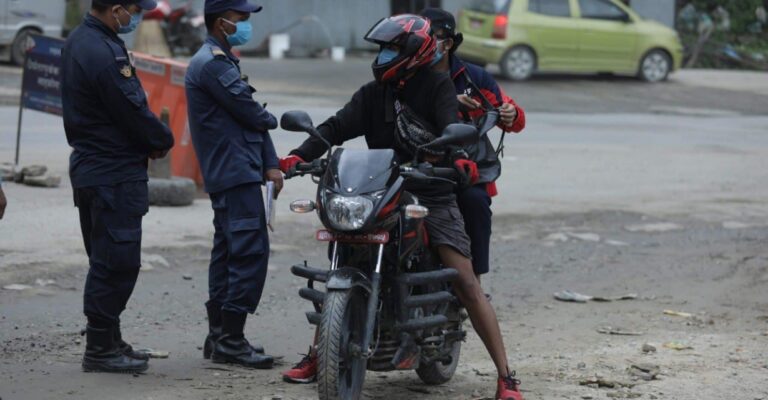
Nepal Police has started a campaign to check whether a person is driving under the influence of narcotic drugs.
The campaign, which was started by Metropolitan Police Range, Lalitpur on the day of Holi on March 29, has been launched to other places as well.
According to the police headquarters, the new campaign to control driving under influence of drugs was started after the successful project against drunk driving.
Police say that the new project will not only help control the frequency of accidents but also decrease the trade and consumption of psychotic drugs and other narcotic substances.
Metropolitan Police Range, Lalitpur, on the day of Holi, had conducted drug test on seven suspicious riders out of which three were found driving under the influence of drugs.
Senior Superintendent of Police Kiran Bajracharya said, “We were surprised with the test results, and it proves that many people, mostly youths, drive under the influence of psychotic drugs in Kathmandu valley.” He further said that checking for drugged-driving drastically decreases accidents, and helps control rampant use of illegal substances.
According to police, the cases of drugged-driving is confirmed through urine tests, as their results come within a minute and are 99.9 per cent accurate.
“For now we are conducting urine tests of only the suspected persons,” SSP Bajracharya said.
Although police do not have exact data to prove how many accidents are caused due to the consumption of drugs, Nepal police often find that young bike riders injured or deceased in vehicular accidents had consumed narcotic drugs.
The police headquarters had also directed Kavre police to conduct similar tests in Banepa on truck drivers. The trucks that ply the eight-lane Banepa-Koteshwor road have been notorious for causing fatal accidents.
SSP Basanta Bahadur Kunwar, spokesperson for Nepal Police, said that they had begun the drug testing campaign in Banepa after receiving complaints that truck drivers, who are mostly below 30 years of age, drive on the route under the influence of narcotic drugs. However, the tests conducted on seven drivers showed that no one was drugged while driving.
Police said that tests for drugged driving is a daunting task as it requires the police to arrange public toilets on the roadsides to collect urine of suspected drivers/riders. Similarly, the rapid test kit used for test can only detect use of certain psychotic substances such as marijuana and some common narcotic drugs.
Another challenge for the cops will be ascertaining whether the driver is freshly drugged as the kit will show positive results even if the driver/rider had used the contraband a week ago. One test kit costs Rs 150 and various police ranges have said they lack the budget to buy the test kits.






